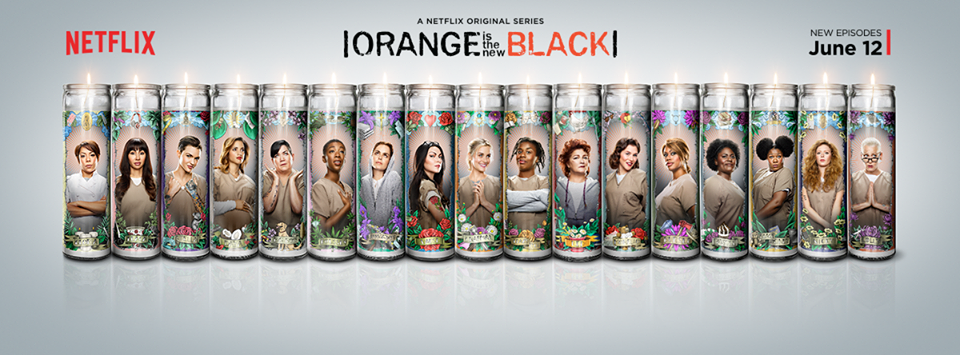Orange is the New Black Season 3 Review
Fair warning: there are spoilers beyond this point, trust this bitch.
The thing about a series like Orange is the New Black is that it’s easy to forget that your favorite characters are stuck where they are, and even before that, some of these characters didn’t exactly have the best lives.
Where Season Two treated us to the Big Bad villain kind of arc, it’s pretty much confirmed at the start of the season that Vee (played by the wonderful Lorraine Toussaint) is dead and gone. Season Three takes us back to the basest facts of the series: that this is a prison, these people are inmates.
Series creator Jenji Kohan and her writing team did exceptional work in the first two seasons, and they’ve only gotten better at it in season three.
Before the worst
I’d always thought that the reason for the flashbacks was to answer the question “what are you in for?” – Which they do, in a way. This season, the flashbacks reveal so much more for so many other characters as opposed to sticking to the main protagonists.
To see supposedly second-string characters like Big Boo (Lea DeLaria) and Chang (Lori Tan Chinn) put in the spotlight is refreshing. There’s Flaca (Jackie Cruz) and her struggle with her insecurities in proportionate opposition to her optimism, and the reasons behind Norma’s (Annie Golden) supposed muteness.
Where’s Piper?
This season was approached with a different kind of emotional depth, there’s calm and confidence to the humor that does peek out at unexpected moments. There’s drama, and it’s compelling in ways that build from the previous season.
I’ll be honest, I found much of Piper’s character whiny and irritating in the first season – until I’d realized that it was the point. She was made to be a caricature of privilege and what happens when someone is placed in an environment so far removed from her own – even if she did have something to do with it.
Her changes in the second season and in the third have made her more intriguing. In the case of season three, though. There’s a definite case of escalation in the way that she moves around within the prison and the way she treats the people around her. It makes her only a little bit more shocking, and she is eclipsed by the other stories taking center stage.
To be able to expand beyond the central protagonist and make the story revolve around those that affect her is a great thing for a show. Piper (and other major characters) being pushed out of the main spotlight allowed other characters’ stories to be explored, regardless of whether or not the switching out was because they’d gotten on other shows.
In with the new
In removing the focus from Piper, we get to see more of the people that run the Litchfield Correctional Facility. Perhaps the only thing that I wholly disliked about this is the way Healy (Michael Harney) dealt with his new co-counselor Berdie Rogers (Marsha Stephanie Blake) and by extension, its effects on Brook, Suzanne, and the other women who might’ve benefited from a counselor like her.
One common thing I noticed about the season was the way that the plot for some of the characters would escalate fairly quickly. While we saw very little of Alex – for example – the times that we did see her plainly showed how much fear she held in over her former employer. Pennastucky’s story was all the more visceral and really showed just how much damage had been done to prior to the drugs.
The main story of the season – the integration of Litchfield into a prison conglomerate – felt like a setup for the end of the series as a whole. While I won’t spoil the events of the finale, the series tagline “The Third Coming” is a definite game changer. We’ll just have to wait for season four to find out how big a game changer she will be.






Great review! I agree that focusing on other characters was beneficial to the show since it adds wrinkles to the show by further playing with our expectations regarding certain characters – who could have anticipated that Chang would be terrifying? Piper being pushed from the central role definitely helped in making the show feel like an ensemble piece though I still contend that she’s still the lead character; I might be wrong, but I think she’s the only character to appear in every episode.
The theme of motherhood seemed to be a lot stronger and more prevalent this season than in previous seasons, or it was simply explored in greater depth by having more characters expressing their own views and challenges as opposed to the previous seasons, where motherhood was mostly seen through what a ‘prison mom’ is. The show did a wonderful job of exploring this, and it helps that it pushed two great characters, Sofia and Gloria, into conflict with one another.
While the show is competing as a Drama in this year’s Emmy Awards, this season made it more apparent that the show is a Comedy, with the season generally being much, much funnier, especially after season 2 spent so much time concentrated on Vee and everyone’s conflicts with her. That said, the show did excel in its dramatic moments as well, especially Black Cindy’s conversion to Judaism, or Sofia’s story in the penultimate episode.
Not having a central villain unlike Season 2’s Vee was a huge risk for the show that paid off. The slice of life approach, similar to the first season, was refreshing, with the stronger and more confident characterisation shining through, especially as the season reached its climax.